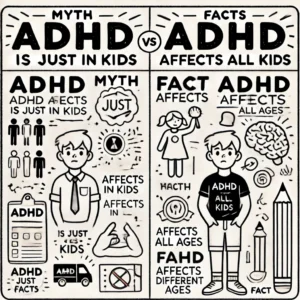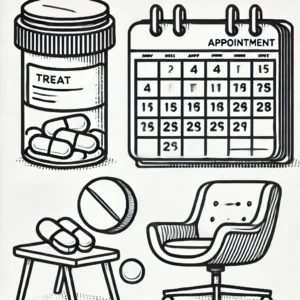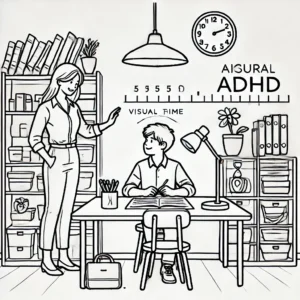ADHD, or Attention Deficit Hyperactivity Disorder, influences multiple areas of daily functioning, often creating challenges in personal and professional life. While ADHD is commonly associated with children, many adults experience persistent symptoms that can impact work, relationships, and overall quality of life. Understanding how ADHD affects daily life can help individuals seek appropriate support and develop effective coping strategies. Here’s a closer look at some of the most significant ways ADHD impacts daily living.
Work and Productivity
Challenges at Work: Adults with ADHD may find it hard to meet deadlines, manage tasks, and stay organized. Common symptoms, such as inattention, impulsivity, and forgetfulness, can make it difficult to complete tasks efficiently. For example, an individual with ADHD may struggle to prioritize tasks, leading to last-minute rushes or missed deadlines.
Time Management and Planning: Planning and time management are central issues for many people with ADHD. Staying on top of tasks, appointments, and deadlines often requires extra effort. Many individuals with ADHD find it challenging to break down tasks into manageable steps, leading to overwhelm and procrastination. Tools like planners, digital reminders, and structured routines can be helpful but require ongoing effort to maintain.
Workplace Stress and Burnout: The daily struggle to stay organized and focused can lead to significant stress. Many adults with ADHD report feeling exhausted by the end of the workday, especially if they’ve had to exert extra effort to maintain productivity. The ongoing effort to manage symptoms, combined with fear of being judged or misunderstood, can contribute to workplace burnout. Seeking support from ADHD-friendly work resources, like those offered by the ADHD Foundation, can be beneficial.
Relationships and Social Interactions
Difficulty Maintaining Relationships: Social relationships often require focus, empathy, and memory—areas where people with ADHD may experience challenges. Forgetfulness can lead to missed plans, while difficulty paying attention can cause frustration in personal relationships. For instance, a partner or friend may feel hurt if they perceive the individual with ADHD as “not listening” or “not caring,” even when that’s not the case.
Communication Challenges: Impulsivity, a common ADHD symptom, can result in frequent interruptions or difficulty listening during conversations. Additionally, inattention might make it hard for someone with ADHD to follow long discussions or remember details, which can lead to misunderstandings. Learning strategies for active listening, taking notes during important conversations, and practicing mindful communication can help mitigate some of these challenges.
Parenting with ADHD: ADHD can impact parenting, as staying organized, managing routines, and maintaining patience are essential but often difficult tasks. Parents with ADHD may struggle to enforce consistent routines or juggle the demands of their children’s schedules, which can be overwhelming. Parenting support groups or resources from the ADHD Foundation provide useful tools for ADHD parents to help them better manage their roles.
Daily Routines and Household Management
Difficulty Sticking to Routines: ADHD often affects a person’s ability to maintain consistent routines, whether for work, home, or self-care. For instance, remembering to pay bills on time, stick to a cleaning schedule, or even keep up with personal hygiene tasks can become difficult without structured support systems in place. Many adults with ADHD benefit from visual reminders, checklists, or designated “routine times” to help them stay on track.
Household Organization: Tasks like cleaning, organizing, and managing paperwork can be particularly challenging. The ADHD brain often struggles with attention to detail, which may lead to overlooked or half-finished tasks. Even the concept of “out of sight, out of mind” can affect how someone with ADHD organizes their living space, sometimes leading to clutter.
Financial Management: Many individuals with ADHD report challenges with managing finances, from budgeting to paying bills on time. Forgetting due dates or losing track of spending can lead to financial stress. Breaking down tasks like bill payment into smaller steps and automating payments when possible can ease some of the burden.
Mental Health and Self-Esteem
Impact on Mental Health: Living with ADHD can be overwhelming, especially if someone feels misunderstood or judged. Many adults with ADHD also experience co-existing conditions, such as anxiety and depression. Anxiety can stem from the fear of forgetting important tasks, while depression might develop from a cycle of perceived failures and frustrations.
Self-Esteem and Self-Perception: Struggling with ADHD symptoms daily can take a toll on self-esteem. Adults with ADHD might feel as though they’re constantly “falling short,” which can lead to feelings of inadequacy and low self-worth. Seeking support from counselors who understand ADHD, as well as connecting with ADHD support groups, can foster self-acceptance and confidence.
Stress and Emotional Regulation: ADHD can also affect how individuals handle stress and regulate their emotions. Impulsive reactions, mood swings, and difficulty processing emotions are common. This can lead to misunderstandings in social or work settings, sometimes making those with ADHD feel isolated or frustrated. Mindfulness practices and Cognitive Behavioral Therapy (CBT) have shown to help improve emotional regulation for adults with ADHD.
Managing ADHD in Daily Life: Practical Strategies
While living with ADHD presents unique challenges, there are effective strategies to help manage daily life.
- Create Structure and Routine: Establishing a daily routine can reduce anxiety and improve productivity. Try breaking down tasks into smaller steps and using checklists to stay organized.
- Use Tools for Time Management: Digital tools, such as alarms, reminders, and scheduling apps, can help manage time effectively. Setting alarms for important activities, like meetings or medication times, can improve punctuality.
- Practice Mindfulness and Relaxation Techniques: Mindfulness can help improve focus and reduce impulsivity. Simple relaxation exercises or meditation can provide calming effects, which may improve emotional regulation.
- Seek Support from Family and Friends: Having a strong support system can make daily life easier. Talking openly with family or close friends about ADHD can foster understanding and reduce misunderstandings.
- Professional Help: For those who find it difficult to manage ADHD on their own, professional support, such as counseling or ADHD coaching, can provide strategies and accountability. The NHS ADHD guide offers resources and recommendations for adults seeking treatment and support.
Finding Support and Resources
Recognizing and understanding ADHD’s impact on daily life is an important step toward effective management. Many organizations, like the ADHD Foundation and Mind UK, offer resources, support groups, and counseling to help people with ADHD better navigate daily challenges. Professional support can provide valuable strategies to enhance productivity, strengthen relationships, and improve well-being.
In summary, ADHD affects work, relationships, and household tasks, often requiring individuals to develop tailored strategies to cope with these challenges. With the right tools, support, and understanding, adults with ADHD can build fulfilling, organized, and productive lives.









